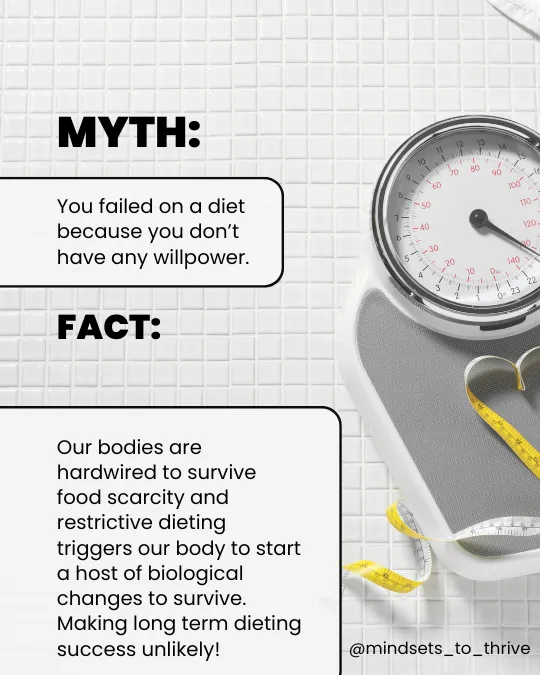
Diets Don’t Work
Diets Don’t Work: Breaking Free from the Dieting Cycle and Embracing a Healthier Relationship with Food
For many of us, dieting has been a recurring theme in our lives. We’ve been told that achieving a specific body shape or size is just a matter of willpower, discipline, and the right diet plan. Atkins, Keto, Carnivore, Miami—whatever the latest trend, we invest our time, money, and energy into following the rules in pursuit of success.
But for most, the story unfolds in a frustratingly familiar way:
Start a new diet.
Buy new foods, remove “forbidden” foods, and maybe even purchase books or apps to stay on track.
Experience initial weight loss and a sense of accomplishment.
Around 6-8 weeks in, hit a plateau and find it harder to stick to restrictions.
Cravings intensify, willpower weakens, and eventually, the diet is abandoned.
Regain the lost weight—often with extra pounds.
Feel guilt, shame, and the urge to try again with a “better” or more restrictive diet.
The cycle repeats.
This pattern, known as yo-yo dieting, is incredibly common. But does it mean we’re failing? Are we just not strong enough?
Absolutely not.
The Science Behind Why Diets Don’t Work
If we look at human biology, it becomes clear that our bodies are wired for survival—not aesthetic goals. Throughout history, food scarcity was a real threat, and our bodies evolved to adapt to it. When faced with calorie restriction, a series of survival mechanisms kick in:
Metabolic Adaptation – When we eat less, our metabolism slows down to conserve energy. Studies have shown that prolonged calorie restriction leads to a reduction in resting metabolic rate, making further weight loss increasingly difficult (Fothergill et al., 2016).
Hormonal Changes – Hunger-regulating hormones shift dramatically. Ghrelin, the hormone that signals hunger, rises when calorie intake is restricted, while leptin, the hormone that signals fullness, decreases. This makes cravings and food obsession stronger the longer we restrict. (Sumithran et al., 2011)
Psychological Effects – When food is off-limits, we want it more. This is known as the restrict-binge cycle, where periods of deprivation lead to intense cravings and overeating. This is not a failure of willpower—it’s human psychology.
Weight Regain is Common – Research indicates that more than 80% of people who lose weight through dieting regain it within five years, and often gain additional weight due to these metabolic and hormonal adaptations (Anderson et al, 2001). This is our bodies way of preparing us to survive the next “famine”.
Breaking Free from the Dieting Cycle
As mothers who have experienced the ups and downs of dieting, we have the opportunity to break the cycle—not just for ourselves, but for our children. Our kids are watching us. They absorb our relationship with food and our bodies, and we have the power to model a healthier, more sustainable approach.
So what can we do instead of dieting?
Ditch the “Good” vs. “Bad” Food Mentality – All foods can have a place in a balanced diet. Teaching children that no food is inherently “bad” reduces guilt and binge-eating tendencies. Telling someone not to eat a food because it is bad, usually doesn’t stop them from eating it. Usually it just leads them to feel bad for eating it.
Honor Hunger and Fullness – Rather than following rigid food rules, listen to internal cues. Encourage kids to eat when they’re hungry and stop when they’re satisfied. Ditching ideas that we grew up with like “Finish your plate” or “If you don’t finish dinner there will be no dessert” are helpful.
Focus on Health, Not Weight – Shift the focus from weight loss to behaviors that support long-term well-being, like getting enough sleep, moving our bodies in enjoyable ways, nutrient rich meals, regulating our emotion and reducing stress.
Model Self-Compassion – Speak kindly about your own body. Children who see their parents embracing body diversity and self-acceptance are more likely to develop a positive self-image.
Encourage Mindful Eating – Rather than eating out of stress or boredom, practice mindful eating by savoring food and tuning into hunger and fullness cues. When eating focus on making it an event – put your devices away, TV off and focus on the experience of the food itself like the loo, smell and taste of it.
Final Thoughts: A New Approach to Nourishment
Diets don’t work—not because we aren’t trying hard enough, but because they go against how our bodies are designed to function. Instead of chasing the next quick fix, we can shift towards a more intuitive, compassionate approach to eating—one that fosters health, happiness, and body acceptance for both ourselves and our children.
Let’s break free from the dieting cycle and create a legacy of self-love and nourishment.
References:
Fothergill, et al (2016). Persistent metabolic adaptation 6 years after “The Biggest Loser” competition. Obesity. Vol 24. Issue 8.
Sumithran P, Prendergast LA, Delbridge E, Purcell K, Shulkes A, Kriketos A, Proietto J. Long-term persistence of hormonal adaptations to weight loss. N Engl J Med. 2011 Oct 27;365(17):1597-604. doi: 10.1056/NEJMoa1105816. PMID: 22029981.
Anderson JW, Konz EC, Frederich RC, Wood CL. Long-term weight-loss maintenance: a meta-analysis of US studies. Am J Clin Nutr. 2001;74(5):579–584. doi: 10.1093/ajcn/74.5.579
